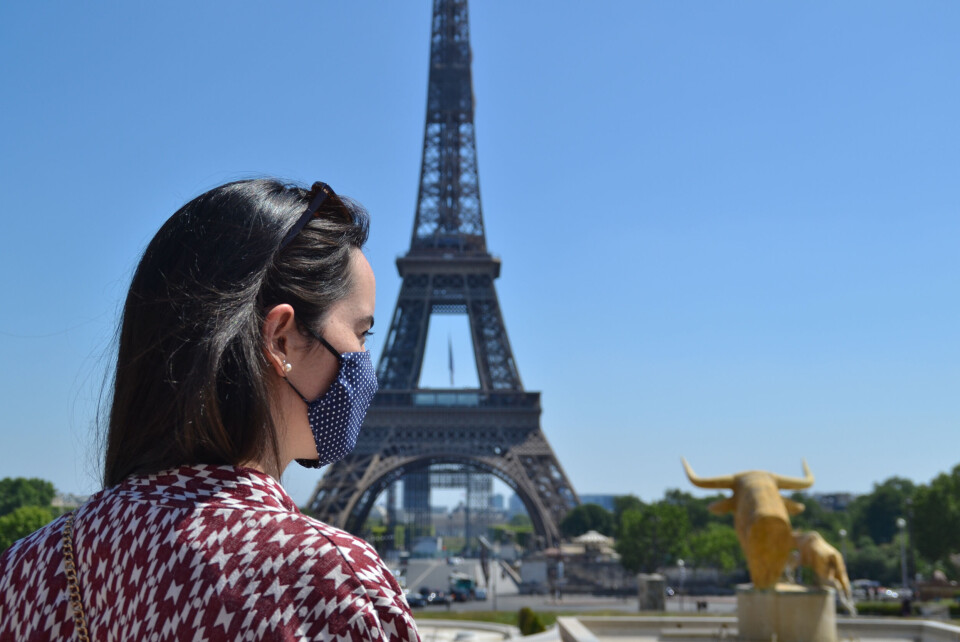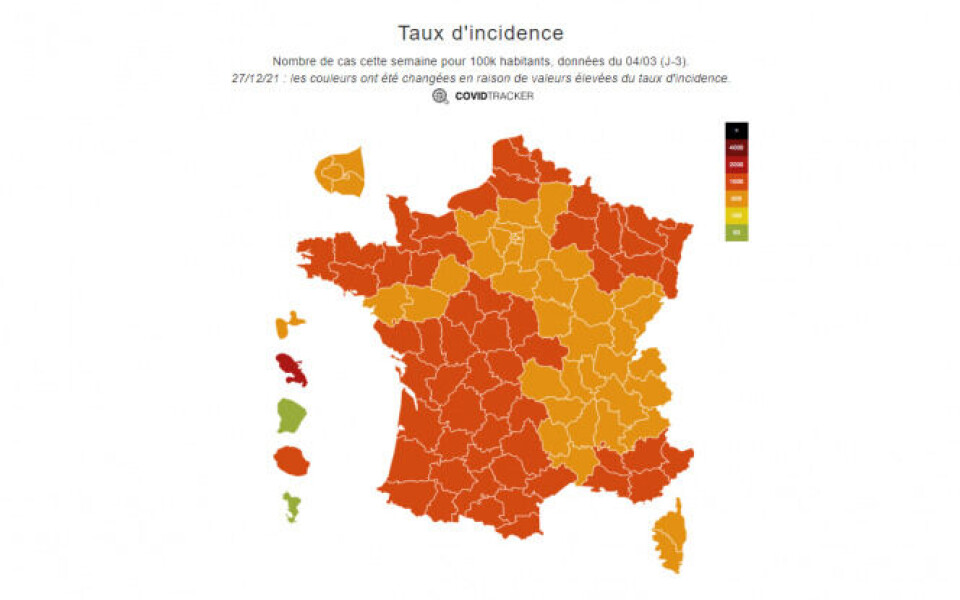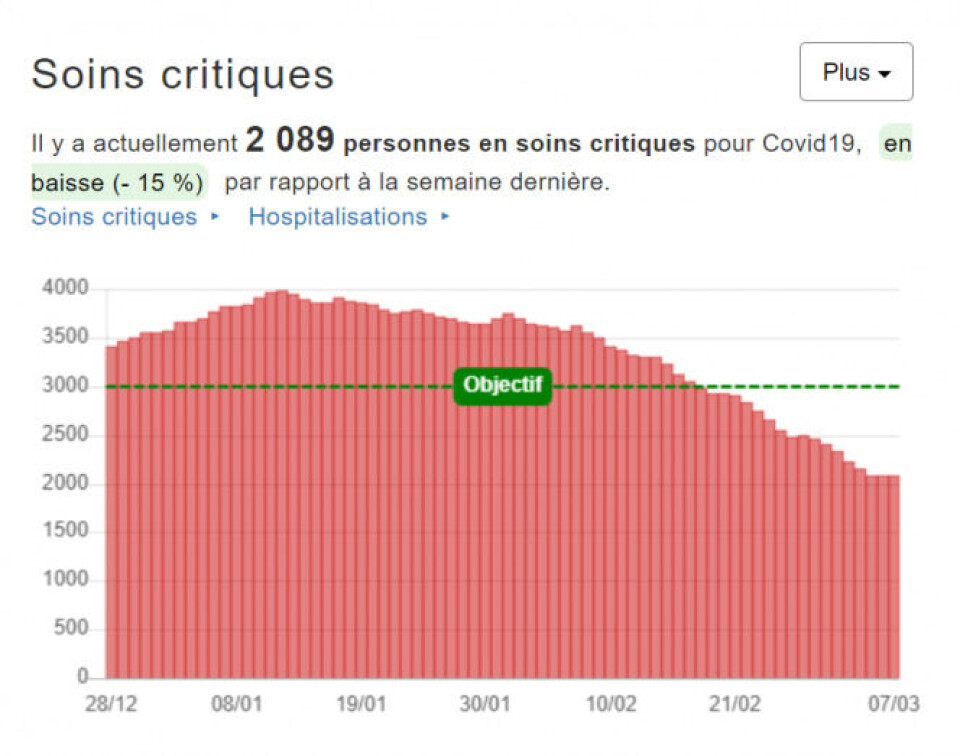-
France impacted by EU approval for €3 tax on small parcels from outside the union
Tax could coincide with separate French fees for parcels says Finance Ministry
-
Winegrowers outraged by €0.01 bottle of wine in French supermarket
Lidl claims labelling error but local farmers’ union says it threatens local production
-
Farmers block roads and clash with police in Occitanie over cow culling order
A75 blocked by around 100 tractors with protests set to continue into weekend
Covid France cases stop falling but no reason necessarily for concern
Cases are higher in Brittany, the north east and south west but hospitalisations are dropping. It comes as the vaccine pass is set to be lifted on March 14

Covid case numbers in France have stopped falling in the past two days, reversing a trend of decreasing case numbers that began on January 24.
It is thought in part to be caused by the increasing spread of a new Omicon sub-variant called BA.2, which now makes up 38% of total cases. There were only 60 confirmed cases of it in January.
It could also be down to more cases appearing in areas that were previously less severely affected by the epidemic, or Covid measures being relaxed and people taking less care.
The number of people being hospitalised, admitted to intensive care and dying of Covid in hospitals is still, however, continuing to decrease.
We look at what this uptake in cases means in terms of the pandemic and the planned lifting of the vaccine pass on March 14.
Covid cases back on the rise
The number of positive Covid cases recorded in France in the past two days is higher than on the same day one week ago, the first time there has been a rise like this since January 23.
This could mark the beginning of a trend of increasing cases, said Guillaume Rozier, a data expert and the creator of Covidtracker.fr, a website that gives visual insights in Covid-related stats.
He said, though, that this could not be confirmed for another couple of days.
Une reprise épidémique semble débuter, mais il va falloir attendre quelques jours avant de l’affirmer. Le nombre de cas publié aujourd’hui est en hausse (+7,5%) par rapport à celui de lundi dernier. En moyenne sur la semaine écoulée, le nombre de cas continue de baisser (-7,5%). pic.twitter.com/g9ld7WcPQT
— GRZ (@GuillaumeRozier) March 7, 2022
France has recorded an average of 52,715 Covid cases in the past seven days, an overall decrease of 7.5% from the week before.
The rate of positive Covid cases, meaning the percentage of positive tests among all tests taken in the country, also increased in the past few days.
It rose from 18.1% to 18.3%, stats from Covidtracker show, meaning that more people are testing positive.
The number of people being hospitalised for Covid is still decreasing (down 20% in the past week), likewise the number of admissions to intensive care units (down 13% in the past week).
Les admissions à l’hôpital continuent de baisser mais à un rythme moins rapide (-20% en une semaine). pic.twitter.com/RYEpSXbahI
— GRZ (@GuillaumeRozier) March 7, 2022
Three areas particularly affected
Three areas in France - the regions of Brittany and Grand-Est, and the south-west of France - are particularly affected by higher case numbers.
There, several departments have an incidence rate - meaning the number of cases per week per 100,000 people - of over 800.
The national average incidence rate is 538.

Alain Le Tertre, head of the Brittany unit of Santé publique France, told France 3 that these areas may now be seeing more cases because they were less affected by the last Omicron-fuelled wave compared to other parts of the country.
This could be one reason behind the slowdown in the fall in Covid case numbers on a national level.
Another reason could be the increasing spread of the BA.2 variant.
The spread of the BA.2 variant
The sub-variant of Omicron, called BA.1, is today the most common variant of Covid in France. However, it is quite quickly being replaced by a new sub-variant, BA.2.
This second sub-variant now makes up 38% of total cases in France, Santé Publique France states.
Mr Le Tertre of Santé publique France said that BA.2 is “more contagious” than the first sub-strain, “but does not lead to more serious forms of Covid”.
“It is a situation that must be followed day by day,” he said.
French epidemiologist Pascal Crépey told La Dépêche that the level of protection given by the available Covid vaccines remains the same for BA.2.
He also stated that the level of control that France has over the spread of the BA.1 sub-variant is “strong enough” to prevent BA.2 “changing the dynamic of the epidemic”.
It means that even if cases are now rising very slightly, he does not think that it will lead to another Covid wave.
De nouvelles données de l'agence sanitaire britannique confirment que l'efficacité des vaccins contre l'infection symptomatique avec #BA1 est similaire à celle avec #BA2. Elle tombe à près de 50% deux mois et demi après la 3e dose.
— Nicolas Berrod (@nicolasberrod) March 6, 2022
1/3https://t.co/VwKhD7MWpR pic.twitter.com/RqrbUlxXXE
Covid rules relaxing, people relaxing
The French government has gradually been relaxing Covid rules since February 2, lifting rules on wearing masks in certain places and work from home measures.
Equally, travel restrictions have also been eased, making it easier for tourists to enter France.
On top of this, people may be taking less care in their daily life.
Dr Benjamin Davido, an infectologist at the Raymond-Poincaré hospital in Garches (Hauts-de-Seine), said many feel that the pandemic is already over.
“A certain number of people in France already consider that the page has turned, and more and more people are talking about the end of the epidemic,” he told Franceinfo.
“So there is probably a slackening [in terms of following rules and barrier gestures]", he said.
Covid measures easing on March 14
France’s Covid vaccine pass system and mandatory mask-wearing in enclosed public spaces (with some exceptions) are set to be lifted on March 14, in a further easing of restrictions.
We explain the change in our article here: Mask wearing, vaccine pass… new rules for France from March 14.
However, the country’s health minister, Olivier Véran, conditioned the relaxation of rules on March 14 on certain criteria being met.
This includes the country having an R number of less than 1 (more than 1 suggests that the virus is still spreading), an incidence level of less than 500, and less than 1,500 Covid patients in critical care.
The R rate in France is now 0.74 (figures from March 7). This is lower than one, but the rate has been creeping up lately. It was 0.6 on February 21.
The national incidence rate is 538 and it is falling, although the decrease may slow if Covid cases continue to rise.
There are 2,089 patients in intensive care units in France due to Covid, the latest figures from March 7 show. This is up from March 6, when there were 2,079, but down significantly from March 2, when there were 2,329.
It is not certain that this number will drop below 1,500 before March 14.

Will the end of the vaccine pass go ahead as planned?
There has been no official statement from the French government on doubts over meeting the required criteria in the next week.
The country’s labour minister, Elisabeth Borne, announced this morning (March 8) that masks and social distancing would no longer be required in workplaces from next Monday (March 14).
She said that we will “get back to a normal life”.
This suggests the government is moving ahead with its plan to relax measures on March 14.
🔴🗣️ Dès "lundi, on va suspendre le #PassVaccinal, c'est la fin de l'obligation du port du #masque en #entreprises, fin des distances" : @Elisabeth_Borne annonce sur #LCI "la fin du protocole sanitaire en entreprises, on va reprendre 'une vie normale'" | @EliMartichoux. pic.twitter.com/Zr5WfkWjmp
— LCI (@LCI) March 8, 2022
Professor Antoine Flahault, epidemiologist at the Institut Pasteur and a member of government advisory body le Conseil scientifique, said that he recommends keeping mask wearing in enclosed public spaces.
“If Covid indicators have plateaued, then until rates are sufficiently low, in my opinion, the wearing of masks in transport and in enclosed areas is highly recommended,” he told Franceinfo.
Prof Flahault warned as early as January that the BA.2 sub-variant could cause a “rebound” in cases around the country.
What is the Covid situation in other countries?
The number of cases in the UK is once again increasing, after a sharp drop that began in January.
There, 300,017 cases were recorded in the past seven days (latest figure from March 7). This is an increase of 65,914 cases, or 28.2% from the week before.
Generally, daily case rates around the EU and the EEA are continuing to fall. See more here.
























